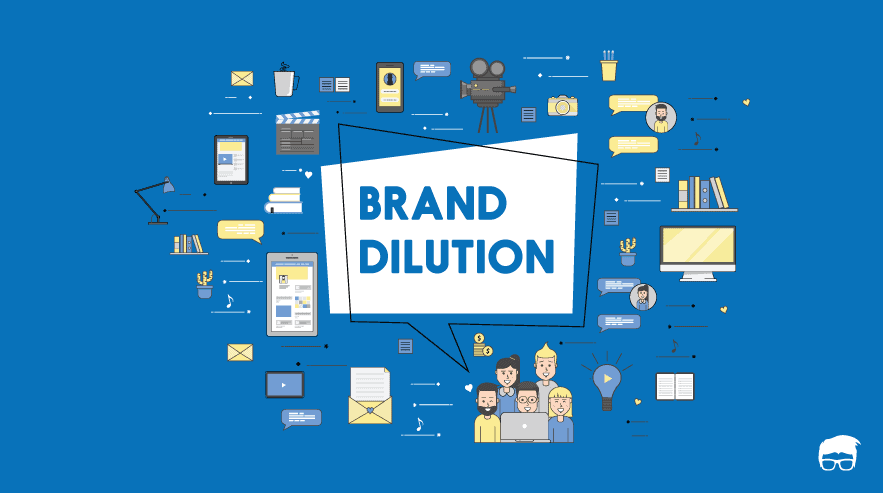Every company plans to expand its offerings or tap into untapped markets to increase its profits and grow. This expansion can be the key to the company’s growth but, if not done correctly, it can cause a huge strain on the existing image and resources. This is what brand dilution is all about.
What Is Brand Dilution?
Brand Dilution is the weakening of a brand due to excessive and unreasonable brand extension.
It is when a company overuses its brand to an extent that the existing image of the brand fades away, the customers are not able to follow where the brand is heading, and/or the quality of the brand’s offerings slips which hampers its existing reputation.
Some key phrases to focus on to understand the definition of brand dilution better:
- Weakening of the brand: It can be the weakening of brand equity or brand image.
- Excessive brand extension: Suppose a phone company has 2 successful devices in the market. An excessive extension is when it launches 4 more to gain market share but is unable to support any of the 6 well enough.
- Unreasonable brand extension: A company famous for Football boots spreads its resources to develop Cricket bats but can’t gain market traction.
Reasons for Brand Dilution
While there are no defining factors that guarantee it, there still remain lots of key factors that can prove to be causes of the brand’s dilution.
Licensing
Licensing a brand isn’t wrong at all. Unless it doesn’t make much sense. The product to which the brand is licensed should reflect the quality and image of the brand. McLaren licensing its brand to Oneplus was fine. They market their phone for its speed, leveraged the idea of how the companies went from ‘underdogs to legends’ and incorporated some suitable design changes in their ‘McLaren’ edition phones.
But McLaren licencing IKEA to use its brand to sell a sofa would have led to brand dilution.
Tapping Into Inappropriate Niches
Expanding into new markets or launching new offerings is common and in fact a must-do for companies to sustain in the long run. But it needs to be done very carefully. Dilution happens when like insensible licensing, companies launch products that don’t really make much sense to the brand. From Arizona Ice-Tea manufacturing Nachos to Harley Davidson making perfumes, just not thinking through the product usually hurt the brand.
Another consequence of this are bad products. A company tapping into a new niche might do things right with the branding and marketing but lack of field experience might inevitably lead to an incompetent product. And when this product doesn’t deliver well, it harms the image of the brand as a whole.
Inconsistency
Not remaining consistent with the core values of the brand is a common cause of brand dilution. A brand needs to maintain the principles on which it was built. Let’s say a hypothetical company Soundz launches itself with professional-grade monitoring headphones at a below-average price and is a huge hit. Sometime later when customers are expecting more refined products at competitive prices, Soundz comes up with an average quality daily-use headphone. Such inconsistency to the foundation of the brand upsets the customers and causes brand dilution.
How To Avoid Brand Dilution
Brand dilution is the consequence of a brand expansion going wrong. A brand can avoid dilution if it carefully manages its expansion.
It’s a common story for brands to confidently get into something only to take a fall later. It is only a matter of time when they realize that they aren’t the first ones to fall into this trap and some proper research would have saved them.
A brand image is like an emotion with the consumer. A brand extension should remain consistent with that image. Irrespective of the extension, whether it is licensing or a new product, the extension should give an expression similar to the original brand. Beats is known for its fashionable premium-looking headphones. A licensing deal with a funky t-shirt brand will be understandable but a deal with a formal suits’ manufacturer won’t seem right.
It is statistically proven that on a long-term basis, an extension doesn’t cause much effect as long as it doesn’t affect a company’s core product. Protecting the brand’s flagship product from any negative effects of extension is another way to be safe from long-term dilution.
Also, having dissimilar extensions doesn’t hurt the brand’s image. A company’s brand and sub-brands must be clearly defined and separated. Dove, made a name for itself as a soap brand is a great example of this. While it was successful with soaps, it successfully brought a line-up of shampoos and deodorants. The key was with marketing. They clearly defined what customers should expect and separated it from their soap marketing. Neither soap nor the deodorant affected the other and both products gained customers. Dove nailed their men’s lineup with the same strategy too.
The company should make sure the extension is going to fill a void and not just be there for extension’s sake.
Examples Of Brand Dilution
Brand expansions are hard to do. Most of them lead to short or long-term watering down of the brand. Here are some examples of how some companies managed dilutions.
Amazon Fire Phone
- Amazon’s Fire Tablets were an established product in the market.
- They introduced the new ‘Amazon Fire Phone’ and it was a failure. The fire phone with its limited app support did not solve any of consumers’ existing problems and was doomed from the start.
- The company had to discontinue it and has been much more successful with their Voice User Interfaces (VUIs) like Amazon Echo lineup.
Segway Scooters
- Segway launched their 2-wheeled scooters that were deemed to be ‘industry-changing’.
- For all shiny benefits, Segway overlooked proper market research. Many issues like parking management, road safety, long-distance carriage, targeted marketing etc. were overlooked. The huge price tag was no help either.
- They had to switch from being targeted to the general public to target the products to open commercial places like theme parks and large offices.
Go On, Tell Us What You Think!
Did we miss something? Come on! Tell us what you think about our article on brand dilution in the comments section.
Likes to delve into anything that sparks curiosity. Interested in talking to you in articles’ comments section.









